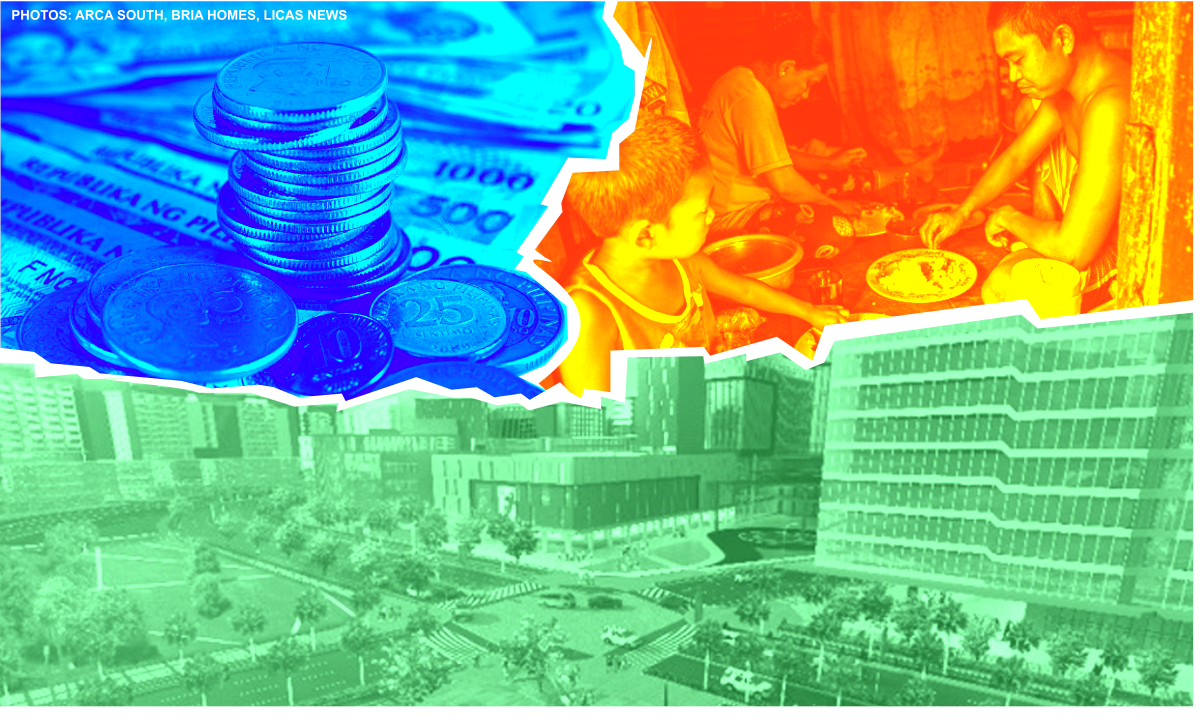Research group IBON said the proposed 2025 national budget is really an agenda of austerity for millions of struggling Filipinos while ensuring prosperity for a rich few.
Themed “Agenda for Prosperity: Fulfilling the Needs and Aspirations of the Filipino People,” the Php6.352 trillion proposed national budget for 2025 is 10.1% higher than the Php5.768 trillion budget for 2024. IBON said however that despite the Marcos Jr administration’s claims, the proposed budget spends less on the needs and welfare of the majority of Filipinos while increasing spending on debt service, and infrastructure that disproportionately benefits those already better-off.
IBON said that the 2025 budget cuts assistance to millions of Filipinos struggling with high prices of goods and services, low incomes and joblessness. Palliative social assistance programs have been the biggest factor in reducing officially reported poverty and large cuts will increase suffering as well as prevent the hyped single-digit poverty incidence by 2028.
Ayuda programs are significantly defunded with the budget for major social protection programs cut by one-fifth (20%) or Php66.5 billion – falling from Php337 billion in 2024 to Php271 billion in 2025. The biggest cuts are in: the Department of Health’s (DOH) support for indigents which is cut by more than half upon losing Php31.2 billion and falls to just Php26.9 billion; the Department of Social Welfare and Development’s (DSWD) Php26.7 billion Ayuda sa Kapos ang Kita (AKAP) program which has been discontinued; and the Department of Labor and Employment’s (DOLE) Tulong Pang-hanapbuhay sa Ating Disadvantaged/Displaced Workers (TUPAD) program which is halved by losing Php14.7 billion and falling to Php14.9 billion.
The health sector budget also decreases by 0.2% (Php550,000) to Php321.8 billion. Funding cuts are mainly in the health department budget which falls by Php23.6 billion to Php223.2 billion, largely from the decline in support for indigent Filipinos. The budgets of specialty government hospitals are also cut – Philippine Children’s Medical Center (Php558.4 million less), Philippine Heart Center (Php197.9 million less), and National Kidney and Transplant Institute (Php139.2 million less), among others. Meanwhile, the Php12.9 billion budget increase for PhilHealth to Php74.4 billion is just a fraction of the Php89.9 billion transferred this year to fund unprogrammed appropriations, IBON said.
The budget for primary and secondary education is virtually stagnant where the Department of Education’s (DepEd) negligible 4.1% increase of just Php31.3 billion to Php793.2 billion barely keeps up with inflation. The budget for higher education is however cut with funds for state universities and colleges (SUCs) falling by 10.6% (Php14.1 billion) to Php118.8 billion, and for the Technical Education and Skills Development Authority (TESDA) by 12.8% (Php2.7 billion) to Php18.7 billion.
The group also noted that funds for the agriculture and agrarian reform sector will decrease by 3.9% (Php9.2 billion) to Php225.8 billion in 2025, mainly due to the Php27.7 billion cut in the National Irrigation Administration (NIA) budget. IBON pointed out that two consecutive years of increasing agriculture budgets have failed to stem rising prices and cutting this may lead to even higher prices as well as more precarious livelihoods for producers.
IBON also said that the already miniscule budget for environmental protection is also on the chopping block and will be decreased by Php1.8 billion to Php22.1 billion in 2025 from Php23.9 million in 2024. This puts into question how serious the administration is about climate change.
On the other hand, even despite supposed fiscal consolidation the administration is somehow always able to prioritize spending on items that benefit key vested interests, IBON observed. Large and larger budgets for infrastructure and debt service are being paid for by the budget cuts in agriculture, ayuda, health and higher education.
The 2025 national budget is still able to allot Php1.5 trillion for infrastructure projects. These are overwhelmingly concentrated in the least poor areas of the country – the National Capital, Central Luzon and Southern Tagalog Regions – and will disproportionately benefit foreign and local big business operations.
The transportation department budget spikes 145% or by Php107 billion to Php180.9 billion. This is mainly due to a Php119.1 billion increase in foreign-assisted big ticket infrastructure projects to Php122.6 billion. The public works department budget decreases by 9.8% or Php97.9 billion to Php900 billion, but still has one of the biggest shares of the national budget at 14.2% of the total.
The allocation for interest payments on debt leaps by Php177.6 billion from Php670.4 billion in 2024 to Php848 billion in 2025. Total debt service is projected at Php2.1 trillion in 2025 if interest payments and principal amortization are added. Even after this, outstanding national government debt is seen to rise to Php17.4 trillion by the end of 2025.
IBON said that as much as the Marcos Jr administration attempts to project that it is prioritizing and bringing prosperity to Filipinos, the proposed 2025 national budget shows instead that it is still putting the wealthy and big business first. Around 19 million or over seven-out-of-10 Filipino families are poor and vulnerable from joblessness, informality and low incomes. They should be the main focus of government resources.



